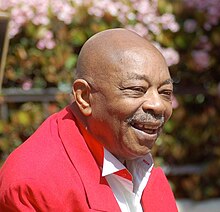Eddie Willis: Difference between revisions
expansion of categories |
add of links to Gibson guitars |
||
| Line 5: | Line 5: | ||
Willis is known for his signature style of muted guitar riffs which added a distinctive tone or "color" to the beat, often timed with the snare, of the hundreds of hit songs recorded at [[Hitsville U.S.A.]] for Motown artists. Among the recordings Willis performed on are "[[Please Mr. Postman]]" by [[The Marvelettes]], "[[The Way You Do the Things You Do]]" by [[The Temptations]], "[[You Keep Me Hanging On]]" by [[The Supremes]], and "[[I Was Made to Love Her]]" by [[Stevie Wonder]]. |
Willis is known for his signature style of muted guitar riffs which added a distinctive tone or "color" to the beat, often timed with the snare, of the hundreds of hit songs recorded at [[Hitsville U.S.A.]] for Motown artists. Among the recordings Willis performed on are "[[Please Mr. Postman]]" by [[The Marvelettes]], "[[The Way You Do the Things You Do]]" by [[The Temptations]], "[[You Keep Me Hanging On]]" by [[The Supremes]], and "[[I Was Made to Love Her]]" by [[Stevie Wonder]]. |
||
Influences for Willis include [[Chet Atkins]], [[Wes Montgomery]], and [[Albert King]]. He played a [[Gibson |
Influences for Willis include [[Chet Atkins]], [[Wes Montgomery]], and [[Albert King]]. He played a [[Gibson Firebird]] guitar on most his early 1960s work, later moving on to use a [[Gibson ES-335]]. On recordings such as The Supremes' "No Matter What Sign You Are", Willis performed on a [[Coral sitar]]. |
||
He accepted an offer from [[Phil Collins]] to perform on his album of Motown and 1960s soul classics, ''[[Going Back (Phil Collins album)|Going Back]]''. |
He accepted an offer from [[Phil Collins]] to perform on his album of Motown and 1960s soul classics, ''[[Going Back (Phil Collins album)|Going Back]]''. |
||
Revision as of 13:05, 22 April 2017

Eddie "Chank" Willis (born June 3, 1936, Grenada, Mississippi, United States) is an African-American soul musician. Willis played electric guitar and occasional electric sitar for Motown's in-house studio band, the Funk Brothers, during the 1960s and early 1970s.
Willis is known for his signature style of muted guitar riffs which added a distinctive tone or "color" to the beat, often timed with the snare, of the hundreds of hit songs recorded at Hitsville U.S.A. for Motown artists. Among the recordings Willis performed on are "Please Mr. Postman" by The Marvelettes, "The Way You Do the Things You Do" by The Temptations, "You Keep Me Hanging On" by The Supremes, and "I Was Made to Love Her" by Stevie Wonder.
Influences for Willis include Chet Atkins, Wes Montgomery, and Albert King. He played a Gibson Firebird guitar on most his early 1960s work, later moving on to use a Gibson ES-335. On recordings such as The Supremes' "No Matter What Sign You Are", Willis performed on a Coral sitar.
He accepted an offer from Phil Collins to perform on his album of Motown and 1960s soul classics, Going Back.
References
External links
- Justman, Paul (2002). Standing in the Shadows of Motown (Motion picture). New York: Artisan Entertainment.
